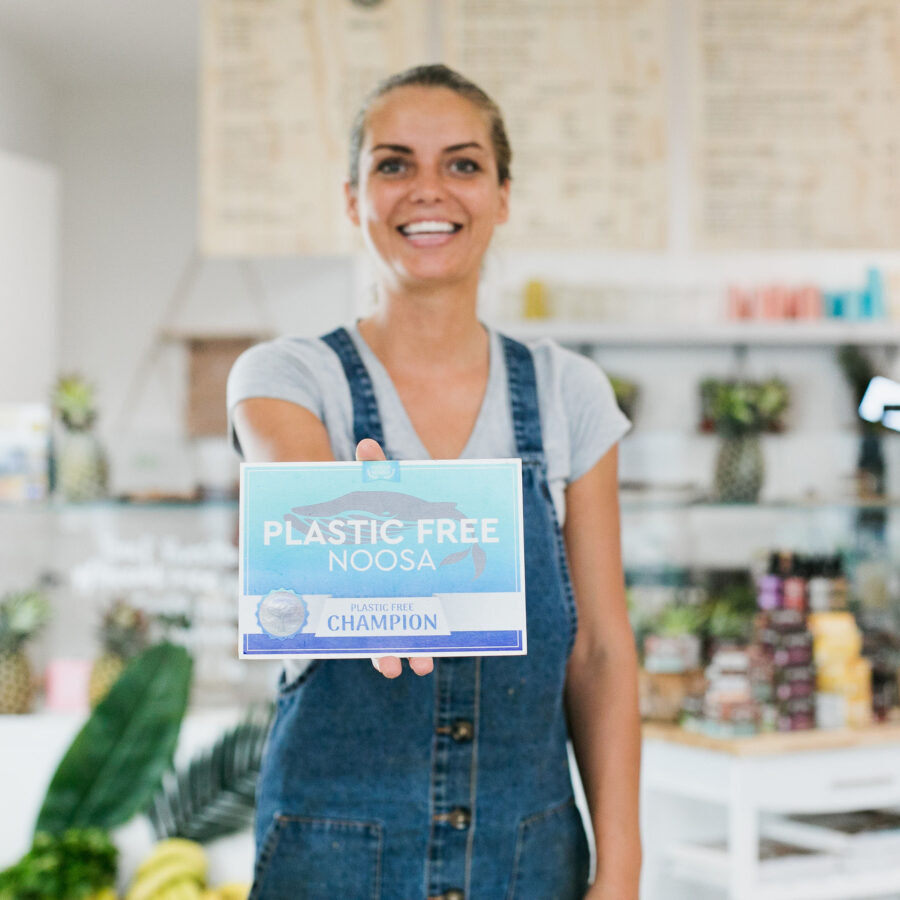Sign-up to become a Plastic Free Noosa Business
Ditch single-use plastic and work towards zero waste operations across your business or organisation and sign-up to become a Plastic Free Noosa Business Member today!
In response to the Queensland State Government's single-use plastic bans effective September 2021, the Plastic Free Noosa Member Criteria now expands beyond the initial six plastic priority items from 2018 and supports additional sectors in 2023.
From March 2023, we are pleased to announce the program is continuing to work towards the elimination of plastic water bottles and takeaway coffee cups and lids, plus now encourages members to work towards zero waste operations in support of the new Plastic Free Noosa Member Criteria.
Members who achieve five of the seven criteria items detailed below will be awarded and promoted as Plastic Free Noosa Champions.
Alternatives:
| Best: Reusable bottles accepted only + refill station | Better: Reusable aluminium bottles + reusable glass bottles | Good: Single use aluminium cans | Okay: Water Box (plant-based carton) |
Plastic bottles form a large component of the litter stream. In the marine environment, they have the potential to survive forever. Once there, they begin to fragment into bite size micro-plastics, killing marine life that mistakes them for food. In a developed nation such as Australia, the need for plastic bottled water is extremely low. In this context, the sale and use of single-use bottled water, which inevitably leads to littering, mismanagement and escape into the environment needs to be reduced if not eliminated.
Alternatives:
| Best: Only accept reusables & have a Mug Library | Better: Simply Cups Collection | Good: Home Compostable | Okay: Commercially Compostable |
Single-use takeaway coffee cups and lids are one of the greatest pollutants in our community today. In fact, Australians consume over 2.7 million takeaway coffee cups each day, that's close to a billion every year - what's worse, this statistic is rapidly climbing! The plastic lining in the cup means the majority of cups are not recyclable, and instead end up in landfill. If mismanaged they have the potential to end up in our oceans. Coffee cup lids are usually made of polystyrene (Plastic Code 6 PS), a particularly toxic and problematic source of marine plastic pollution. Lids often escape bins and landfill, ending up in the ocean.
26% of the volume of waste found in a commercial or industrial general waste bin in Noosa is in fact recyclable materials (2021 Noosa Council). Depending on each individual business's waste infrastructure, this contamination could be due to the recycling bin reaching capacity before it is collected, or simply due to the team not being across what is recyclable in Noosa Shire today.
Since 2018, a state-wide container refund scheme, known as Containers for Change, has been in place across Queensland incentivising the collection and return of eligible containers for recycling, in exchange for a 10-cent refund payment. Containers for Change helps to reduce the amount of drinking containers that are littered in the environment and increases our state's recycling rate.
The Queensland State Government's ban on single-use plastic takeaway food containers, cutlery and straws means businesses are now using recyclable or compostable food containers, hot and cold beverage containers, cutlery and straws. Good riddance to that toxic single-use takeaway plastic packaging!
Unfortunately, takeaway packaging (whilst recyclable or compostable) is still being littered into the Noosa Biosphere Reserve. We know this how? On average, at least 50% of waste collected during a Plastic Free Noosa beach clean-up is some form of single-use takeaway food or beverage container, cutlery or straws.
Manufacturers and distributors are listening to public concerns and are taking responsibility for their environmental impact by adopting more sustainable product packaging design solutions. From upcycled or recycled materials to replace toxic polystyrene, to choosing recyclable and biodegradable cardboard cartons and adhesives - wholesale products supplied in sustainable packaging are becoming increasingly available.
Food for thought...a banana peel buried in landfill can take up to two years to break down. Considering 36% of the volume of waste found in a commercial or industrial general waste bin in Noosa is kitchen and food waste (2021 Noosa Council), two years just for a banana peel is staggering! Unfortunately, when organics are not diverted from general waste and are buried in landfill, the waste has no oxygen and produces methane gas which is 28 times more potent a greenhouse gas emission than CO2. The emissions from Noosa's landfill account for 63% of the Noosa Council's total emissions.
Single-use mini toiletries, dishwashing detergent and laundry powder in accommodation facilities are a prolific source of single-use plastic packaging waste finding its way to Noosa landfill (mismanagement can lead to litter in the environment). To break this down, a Plastic Free Noosa Champion prevented an estimated 66,000 single-use amenity bottles and wrappers from entering circulation in just 10 months by using bulk refillable solutions.
Plastic Free Noosa is a community plan with an aspirational goal to become a community where it is easy to avoid unnecessary single-use plastics, because it simply isn't available anymore.


Ditch single-use plastic and work towards zero waste operations across your business or organisation and sign-up to become a Plastic Free Noosa Business Member today!
Ready to go plastic free? Plastic Free Noosa helps to protect the environment by empowering the Noosa community in eliminating single-use plastics through direct engagement, recognition and facilitating circular economies.
Go plastic free